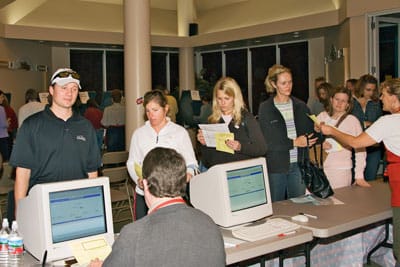City Asks Voters to Consider Re-worded Ballot Questions

by Lisa Crockett
When residents of Castle Pines North (CPN) voted last November to incorporate, they also overwhelmingly passed three tax questions – one sales tax and two property taxes. Each of the property tax questions on the ballot last year simply transferred existing taxes to the new city. As a result, CPN became a city and there was no increase in property tax.
Now, the City of CPN is asking voters to approve a change to correct some technical issues in the original ballot question from November 2007. According to the city, the re-wording of Question 2E from last year will not increase taxes to CPN homeowners. City officials say it involves two technical corrections to the previous tax question related to the transfer of up to 19 mills from the CPN Metro District to the city.
“As the new city has come to life, elected city officials have worked to implement the tax questions under the Colorado taxation system,” said CPN Treasurer Doug Gilbert. “Through the implementation process, several issues with the wording of Question 2E – which appeared on the last election’s ballot – as passed by the voters have come to light. As originally approved, Question 2E allows transfer of up to 19 mills from the CPN Metro District operating fund to the city to be used only for water and sanitation.”
The original text of Question 2E was drafted by the CPN Election Commission in 2007 with the help of attorneys for the incorporation effort.
During the past few months, representatives of the city and the two Metro Districts (CPN Metro District and the Hidden Pointe Metro District) have been in discussions regarding the mechanics of sharing all or part of the 19 mills that was part of the original ballot Question 2E from 2007. According to Gilbert, sharing of funds between the city and the Metro District would allow for lower cost of government through integrated public services with no increase in property taxes.
“Through the better understanding provided by the collaboration of the city and the Metro Districts, it has become apparent that the original Question 2E from last year was too narrowly written,” said Gilbert.
The CPN Metro District does not want to transfer mills that would reduce its operating fund to the city, but suggested the possibility of transferring some of the 24 mills from its debt repayment program without impacting its ability to meet all of its current debt obligations. According to Gilbert, the CPN Metro District has asked for more flexibility in how the transfer mechanism was structured. Gilbert says all of the safeguards of the original ballot question Question 2E remain. “It is simply a discussion of how best to structure revenue-sharing,” Gilbert said.
“This is a critical issue to our community, and the District Board is looking at it carefully before taking any position,” said CPN Metro District Board President Bill Santos. “Ever since the CPN bankruptcy, [which occurred in the early 1980s], the Metro District has worked diligently to develop strong financials and reduce long-term debt. We have to balance the importance of helping to fund city operations with the importance of creating a renewable water solution. Working with the city to fund operations only makes sense, in my mind, if it can be done in a way that does not impact our ability to finance our water solution, which is a fundamental responsibility of the Metro District.”
According to Gilbert, the Metro District and other city interests should work together, not against each other.
“The future of CPN is not only an issue of renewable water.” said Gilbert. “Instead, the city must achieve a viable economy through the tools of a new city and renewable water. If renewable water were enough, Sheridan, Colorado, would be a prime example of a robust economy. Despite having renewable water, a place like Sheridan suffers a blighted economy because of lack of economic development. We must achieve both goals through integration of the city and Metro District services and finances.”
In order to correct the original language of last year’s ballot question 2E, the City Council has referred two tax questions for the November 2008 ballot. The first question, 2D, is a correction to last year’s ballot question and would allow the city to take over a mill levy equal to any reduction in mill levy by the CPN Metro District to be used for general purposes. It is not an increase in property taxes.
The second question on the November 2008 ballot, 2E, would allow the city to collect, retain and spend those property taxes (mill levy) that would be relinquished by the Metro District, and various other taxes such as park fees, water tap fees, facility fees, service charges, inspection charges, administrative charges and grants, etc. This question also is not an increase in property taxes.
According to city officials, the language of the questions was developed with the input and agreement of the city and the CPN Metro District, as well as bond financing attorneys. “The language changes are seen as very important to allow integrated public services and to ensure that renewable water funds are available,” said Mayor Maureen Shul.
City officials say these ballot questions will NOT increase property taxes (mill levys.) The maximum mill levy remains the same, as does the requirement that the CPN Metro District first reduce its mill assessment before the City can assess the equivalent or lesser amount of mills.
“The wording of the new questions clearly indicates that there is absolutely no increase in the tax rate,” said Shul.